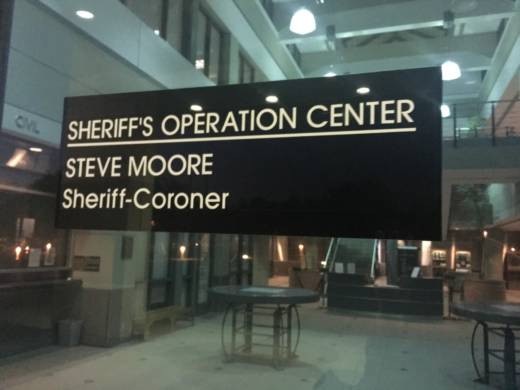She did not respond to a request for comment, but her labor representative, Patricia Hernandez, with the Union of American Physicians and Dentists, spoke for Dr. Parson and Dr. Omalu.
“They do not have the independence and control over their professional practice,” she said. “And they are being told what to do by a non-physician, which is illegal.”
Sheriff Moore did not initially respond to KQED's request for comment. However on Tuesday, after this story first published, Moore posted a statement on the San Joaquin County Sheriff Department's Facebook page denying that he had tried to influence Parson's work.
The signed statement reads in full:
"As the Sheriff and Coroner of this County, I take my job extremely seriously. As Coroner, the law requires me to make the final determination in the manner of death of each case processed here at the Office.
"I deeply value the work of Pathologist Susan Parson and am sad to learn she has a negative view of our experience working together. However, I want to make it clear that at no time did I attempt to control or influence her professional judgement and conclusions."
This is the second time in as many years that a forensic pathologist in California has gone public with accusations of interference from law enforcement.
In June 2016, Dr. Michelle Jorden surprised Santa Clara County’s Board of Supervisors when she testified at a budget hearing that the sheriff had interfered with death investigations. The county has since removed the medical examiner’s office from Sheriff Laurie Smith’s control.
Dr. Randy Hanzlick, a retired medical examiner in Atlanta, Georgia, has extensively studied the sheriff-coroner system, which he says is primarily used in California. He says the advantages to having law enforcement oversee death investigations are mostly financial.
"Because you already have an administrative structure set up within the sheriff's department, you don't have to have another administration for the coroner or the medical examiner," he said.
Also, Hanzlick says, funding for law enforcement tends to remain more steady than for, say, public health departments.
“The disadvantages primarily have to do with either real or perceived conflicts in the way that deaths are investigated," he added.
Hanzlick said there are ways to ensure the integrity of death investigations in jurisdictions where the forensic pathologists work under a sheriff or other law enforcement agency.
“There should be some sort of an agreement in place," he said, "that they consult each other, take each person’s opinions into consideration, and that the pathologist’s opinion is heavily weighed.”
In the coming days, Dr. Parson has promised to send the county administrator and Board of Supervisors an addendum to her resignation letter, including memos that document “specific instances of the injuries and abuses” she says prompted her to resign.
On Tuesday the San Joaquin County District Attorney's office issued a statement saying officials "are looking into the matter."
